Earlier today I was shown some word clouds pulled from various D&D manuals. I found them very interesting, so I went out and created a few of my own — one for each major iteration of the D&D rules.
For those of you unfamiliar with word clouds: They’re a way of analyzing a body of data — in this case, the text of the core rulebooks for D&D.
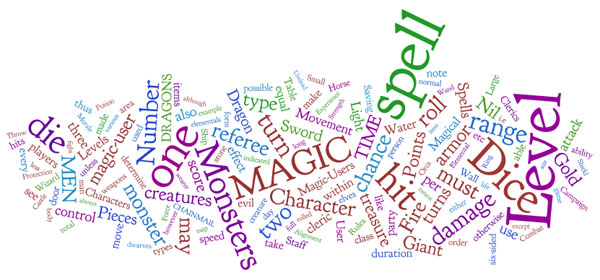
Dungeons & Dragons (1974)
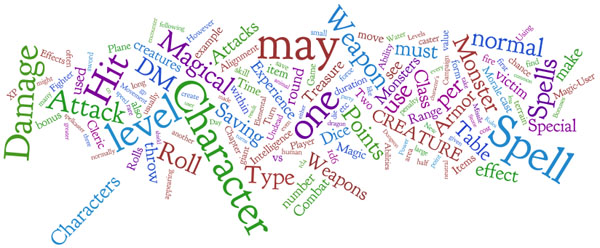
Basic Dungeons & Dragons – Rules Cyclopedia
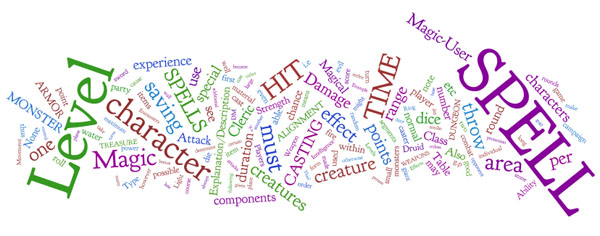
Advanced Dungeons & Dragons (1st Edition)
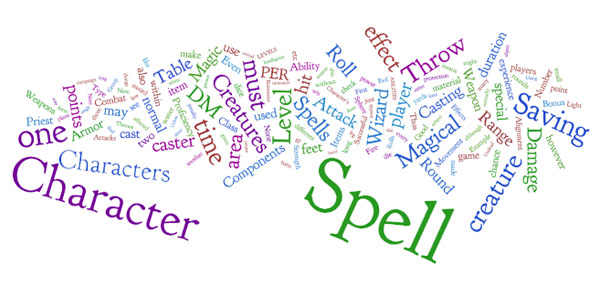
Advanced Dungeons & Dragons (2nd Edition)
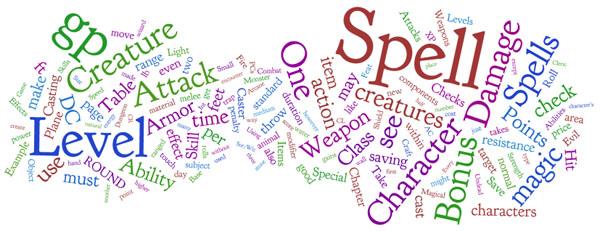
Dungeons & Dragons (3rd Edition)
The thing I find interesting about all of these word clouds is their fundamental similarity. From generation to generation of the game, the same major words pop out consistently: Spell, Level, Character, Damage, Magic, Creature.
Of course, these gross similarities gloss over countless differences. And I can understand that, for some people, those small differences can be huge and insurmountable obstacles. (There are, after all, still people who argue that the thief should never have been added as a class in the Greyhawk Supplement.) But I think the lineage of the game is clear and constant.
And then we come to 4th Edition:
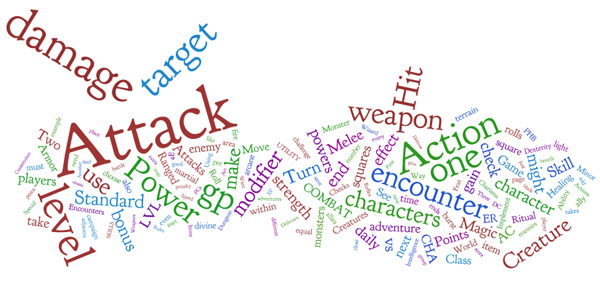
Dungeons & Dragons (4th Edition)
And suddenly everything is different.
I think one can end up hyper-analyzing the differences in ways that are not particularly illuminating or enlightening. (For example, does the prominent “GP” in 3rd Edition’s word cloud indicate an obsession with treasure? Not really. The individual creation costs listed for every magic item in the DMG is most likely responsible. Similarly, one could probably put together a fascinating — but ultimately pointless — analysis of the relative size of the word “character” in each edition.)
But what strikes me about the 4th Edition word cloud — compared to the others — is the substantive and nearly complete shift in prominent terminology.
If, in previous editions, we’re looking at the difference between five card draw, Texas Hold ‘Em, and seven card stud, then I think with 4th Edition we’re looking at the diference between poker and gin.
Of course, this isn’t anything I haven’t said before. But I thought these word clouds were an interesting and different way of looking at the difference between D&D and 4th Edition.
All word clouds created using Wordle (Jonathan Feinberg / CC BY 3.0)












ARCHIVED HALOSCAN COMMENTS
Justin Alexander
You mean the “agenda” I have to demonstrate that 4E changed the core terminology of the game… an “agenda” which you’re apparently a part of since you also claim that it’s true? Does this mean we get to have a secret handshake or something?
Thursday, January 20, 2011, 7:00:39 PM
Troy Lanceman, Quarterback
Depends. Do you also have an agenda against blue skies?
Thursday, January 20, 2011, 7:07:37 AM
Justin Alexander
Your theory is that my “experiment” to demonstrate the terminological changes in D&D 4E “sucks” because… 4E changed the terminology at a systemic level?
That’s certainly an… interesting theory.
I’d share with you my “experiment” to demonstrate the sky is blue by taking pictures of it, but I’m afraid you’d call me out for the methodological error of using so many blue pixels as part of my digital photography.
Thursday, January 20, 2011, 12:05:25 AM
Troy Lanceman, Quarterback
And it’s ‘your’ experiment, man I hate grammar.
Wednesday, January 19, 2011, 8:32:04 PM
Troy Lanceman, Quarterback
Dude, there are 30 levels worth of powers for each class in the 4e Player’s Handbook, each of which follow the exact same format and share the exact same set of key words. The idea that this will throw off the terminology somewhat is blatantly obvious to anyone who’s spent time with the book.
You’re experiment sucks.
Wednesday, January 19, 2011, 8:29:55 PM
PlatinumWarlock
Just to let you know, I found your thoughts very insightful, and wrote a blog entry of my own about them, referring back to your site.
Thanks for the neat idea–it was really insightful!
Wednesday, January 19, 2011, 6:54:24 PM
“John Lee”
We don’t know whether or not 2e, or 3e, or 3.5, or 4e are D&D (“D&D” in this case being OD&D). That’s why we did the word cloud comparison. And, apparently, the syntax of 4e seems significantly different than that of 1e, 2e, 3e, and 3.5e. Editions 0-3.5 compose a majority of D&D, and could be seen as “D&D”, as opposed to 4e (a minority of the D&D brand).
But you only said it offended you, not that it was wrong; and our refutations are likely unnecessary. I’m just being overly defensive. 😛
Also, the first thing a newbie will see is words. They won’t see the system in play until after they’ve been sucked in by the words. And the type of player that the words of 4e will compel seems significantly different from the type of player that the words of D&D past will compel. And grognardish as it seems, this flood of new blood may “destabilize” the roleplaying community and ethos.
But I came in more than halfway through 3.5, so I’m no person to criticize the nooblets.
Tuesday, February 24, 2009, 7:58:12 PM
Justin Alexander
A few points:
(1) Even if the only thing different between the two games were powers and spells (and it’s not), that’s still not a matter of the terminology being changed. Powers are not chosen like spells; they’re regained like spells; they’re not used like spells; and they don’t play like spells.
Are (some of them) still a representation of a wizard wiggling his fingers? Sure. But so are the mechanics of Ars Magica and Sorceror — and those games don’t play like classic D&D, either.
For an example of terminology change, look at the shift from “monster” in OD&D to “creature” in 1st Edition.
(2) In a few days one of my Reactions to OD&D essays will be discussing the issue of “D&D has always been about combat [and nothing else]” at length.
The short version is: Bullshit.
Not only did OD&D feature a wide variety of non-combat gameplay, but every single edition of the game up to the 2nd Edition of AD&D explicitly de-emphasized combat and featured a reward system which strongly discouraged combat solutions.
(3) In your single session of 4th Edition, did your 1st level PCs face an EL 9 encounter? Because that’s what resulted in the OD&D TPK.
The TPK described is primarily the result of a difference in scenario design philosophy — i.e., the world is not there to coddle the PCs. This coddling model of encounter design became fetishized over the past 9 years
Tuesday, February 24, 2009, 2:37:17 PM
NOBODEZ
Fd has always been about combat. It’s a glorified war game. What 4e did was separate the combat and noncombat spells and make everyone use the same rules. Wizards are just as versatile in 4e as in v.3.5, in fact, if they know the ritual, they can just cast the noncombat spell until they run out of time, not spell slots. While I’ve only DMed one session, they PCs didn’t die after the second encounter, like they did in the example OD&D session.
Tuesday, February 24, 2009, 10:29:37 AM
Auroch
The point is that it isn’t.
Also, What 4e reflects is that everything revolves around combat now. There were far more things that worked outside of combat in previous editions.
Tuesday, February 24, 2009, 7:34:42 AM
nobodez
Well, it’s not really a difference in editions, but instead, a difference in terminology. In the previous editions, the primary words all came from the same source, the spells (since level, magic, character, damage, and creature usually were a part of the spell descriptions).
Much the same way, 4e has it’s spells the primary thing. Attack is largest because it’s as synonymous with 4e powers as level was in previous editions. Same with damage, target, and action. It’s not a difference in the game, but a difference in the terminology.
Also, I really dislike your phraseology at the end “difference between D&D and 4th Edition.” 4th Edition in D&D, just like OD&D, AD&D, 3e and v.3.5 are.
Tuesday, February 24, 2009, 1:38:11 AM
Kinda curious how 5E would compare.